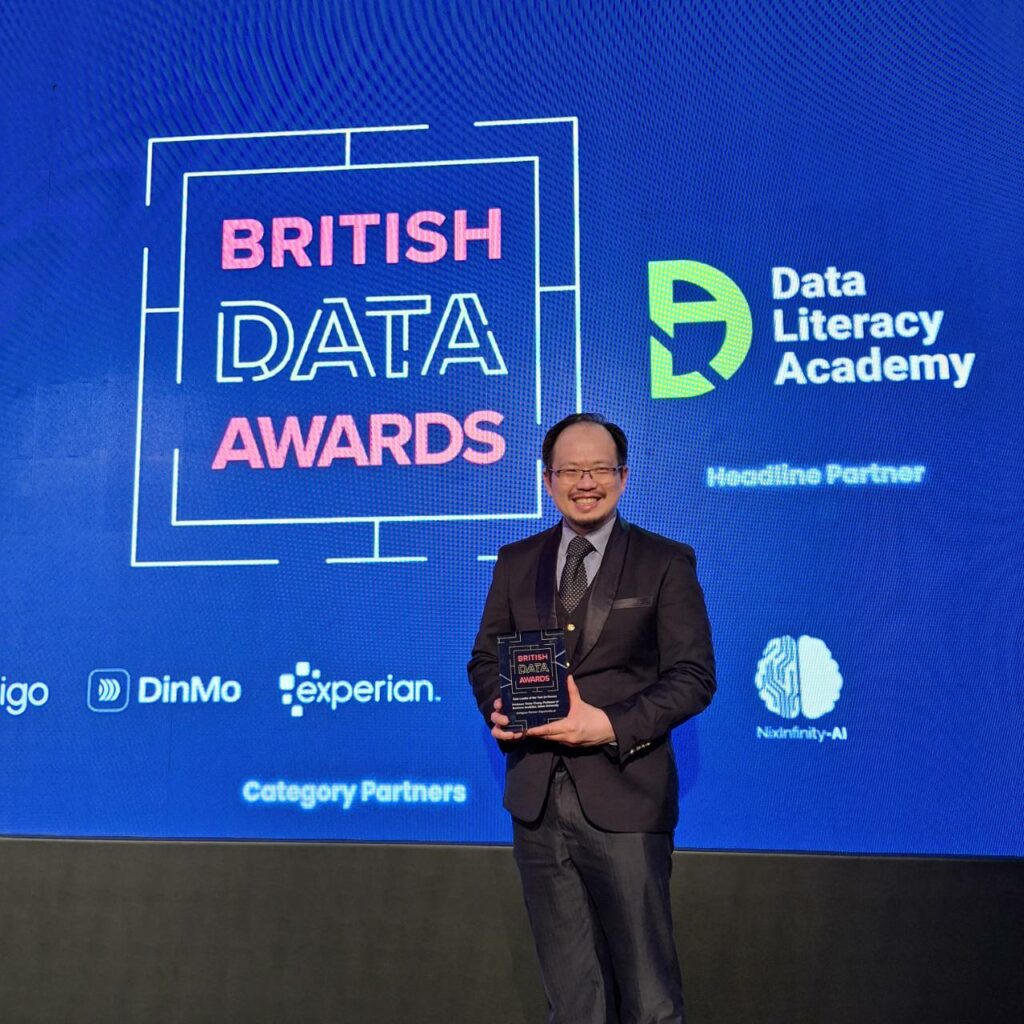Explore More
Victor Chang: The Professor Who Makes AI Work Where It Counts
AI drives faster diagnosis in NHS hospitals, secures financial networks and reshapes analytics education while prioritising ethics and real impact

At 3.20am in a Manchester hospital, an emergency department receives chest X-rays from three patients presenting with breathing difficulties. Within four minutes, an AI system has flagged potential lung abnormalities in two cases, cross-referenced patient histories and guided clinical staff towards targeted interventions. The third patient’s scan reveals no immediate concerns. What once required radiologists working through the night now happens automatically, freeing specialists to focus on complex cases that truly need human expertise.
This isn’t theoretical technology – it’s already running in NHS trusts across England. The architect behind many such systems recently collected the Data Leader of the Year award at the British Data Awards 2025, though Professor Victor Chang of Aston University seems less interested in recognition than results.
Operating Room to Boardroom
Chang’s diagnostic algorithms have processed over 1,000 medical cases across hospitals in the UK and Asia, detecting everything from rare diseases to several types of cancer, diabetes complications and dementia-related issues. The systems reduce diagnostic processing time from hours to minutes while maintaining clinical accuracy.
AI diagnostic tools deployed across NHS trusts now process over 600,000 chest X-rays monthly, with diagnostic accuracy improving from around 75% to 81.1% sensitivity and 81.5% to 86.1% specificity for conditions like skin cancer. One 2023 NHS pilot reduced diagnostic vetting time by 84.3% – from 30 minutes down to 4.7 minutes – while managing over 8,800 patients.
Chang’s approach focuses on integration rather than disruption. Healthcare facilities report that his AI systems slot into existing clinical workflows without requiring major operational changes. Doctors can incorporate the technology into their current practices without retraining entire departments or replacing established protocols.
Financial Firewall
Chang’s machine learning techniques extend beyond healthcare into cybersecurity applications for government organisations and financial institutions. His adaptive threat detection systems monitor network traffic patterns and identify unusual behaviour before it becomes a security breach.
Financial institutions using Chang’s risk assessment algorithms have applied them to examine credit decisions and market volatility. During recent market movements, these predictive analytics tools identified concerning trends early, helping participating institutions develop risk-reduction strategies before volatility hit their portfolios.
The fraud detection algorithms his team developed analyse real-time transaction data across multiple locations, flagging potentially fraudulent activity as it occurs. Financial institutions implementing AI fraud detection typically see fraud losses reduced by 45-60%, with Western banks reporting the higher end of those improvements.
‘This recognition is the result of the hard work of our research teams and industry partners,’ Chang explains. ‘Our main goal is still to make data science solutions that solve real-world problems in many fields.’
Classroom Without Walls
Chang teaches business analytics at Aston University, combining theoretical frameworks with case studies drawn from corporate partnerships and current research. His teaching methodology has spread to institutions worldwide, incorporating practical business examples alongside academic theory.
His open-source educational platforms offer analytics training tools particularly valuable for students in underprivileged areas where advanced technical education remains difficult to access. Chang’s digital education projects have reached over 100,000 professionals and students globally across more than 25 years of teaching.
The open education analytics movement has gained momentum partly because tools like Chang’s reduce costs while improving data-driven decision-making in educational settings. For underserved communities, these platforms provide access to sophisticated analytics training that might otherwise require expensive software licences or university enrollment.
Policy Without Grandstanding
Chang serves on advisory boards for technology regulatory bodies, contributing expertise in AI ethics and data protection regulations. His testimony has influenced lawmakers seeking to balance technological advancement with privacy protection.
With over 300 peer-reviewed publications and more than 20,000 citations, Chang’s academic work spans AI ethics, data architecture and sustainable business applications. His collaborative relationships extend across continents, particularly through partnerships with Asian institutions that facilitate knowledge exchange between Eastern and Western data science approaches.
These collaborations have contributed to data policy development in multiple countries, though Chang’s focus remains on practical implementation rather than policy proclamations. His advisory work emphasises ethical data use across both enterprise and non-profit sectors.
Building the Next Layer
Chang’s current research priorities include developing cybersecurity frameworks for critical infrastructure, privacy-preserving healthcare analytics and ethical AI systems for autonomous applications. These projects maintain his emphasis on tools that address genuine operational needs rather than speculative future scenarios.
The privacy-preserving healthcare analytics work particularly addresses growing concerns about medical data security as AI systems become more prevalent in clinical settings. NHS implementations of AI diagnostic tools require robust data protection frameworks that maintain patient confidentiality while enabling effective machine learning.
His cybersecurity framework development for critical infrastructure reflects the reality that energy grids, transportation systems and financial networks increasingly rely on interconnected digital systems. As cybercrime costs are projected to reach $10.5 trillion globally by 2025, practical defensive tools matter more than theoretical security models.
Results That Travel
Chang’s work suggests a different approach to technology implementation – one that prioritises operational effectiveness over flashy announcements. His diagnostic systems actually speed up patient care in working hospitals. His fraud detection algorithms genuinely catch suspicious transactions before they become losses. His educational tools reach students who might otherwise lack access to advanced training.
For executives weighing AI investments, Chang’s track record offers a useful benchmark. Rather than promising revolutionary change, his systems deliver measurable improvements to existing operations. The advantage they provide isn’t hypothetical – it’s already running in emergency departments, trading floors and classrooms around the world.




